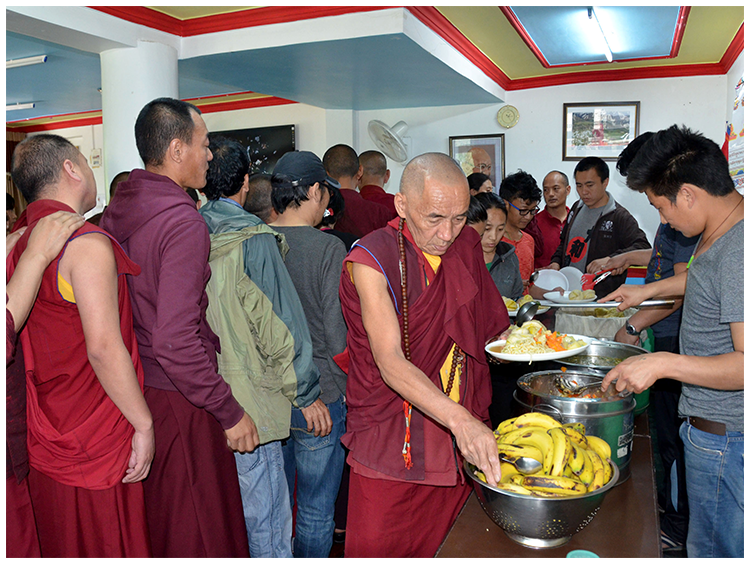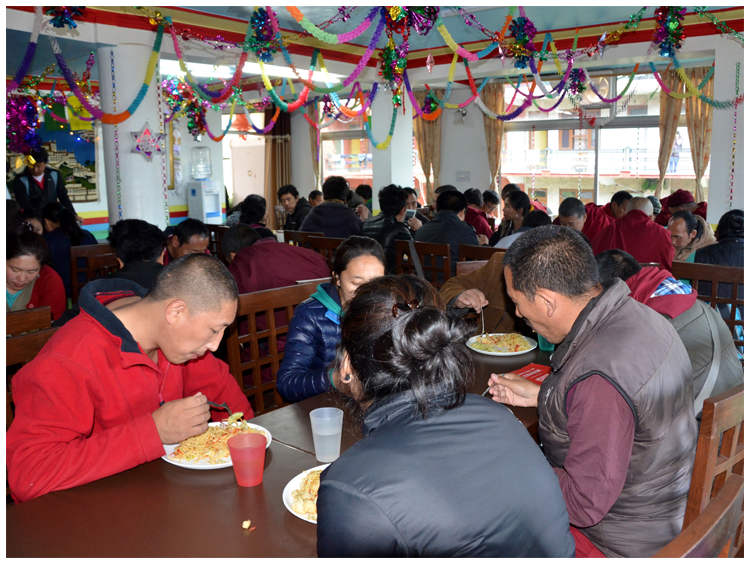 Being a popular tourist destination, Dharamshala attracts travelers from all over the world and while this has been beneficial in raising support for the Tibetan cause and promoting awareness of Tibetan culture and Buddhism, it has driven up the cost of living in the area. The effects of the high cost of living, along with unemployment rates and lack of affordable housing, invariably affect food security and access to nutritious, well-balanced meals. These issues in turn lead to various diseases related to malnutrition and general ill-health. According to a 2009 Tibetan survey, 44% of Tibetans living in Dharamshala suffer from chronic lifestyle diseases such as Type 2 Diabetes, gastritis, cirrhosis of the liver, heart disease and hypertension.
Being a popular tourist destination, Dharamshala attracts travelers from all over the world and while this has been beneficial in raising support for the Tibetan cause and promoting awareness of Tibetan culture and Buddhism, it has driven up the cost of living in the area. The effects of the high cost of living, along with unemployment rates and lack of affordable housing, invariably affect food security and access to nutritious, well-balanced meals. These issues in turn lead to various diseases related to malnutrition and general ill-health. According to a 2009 Tibetan survey, 44% of Tibetans living in Dharamshala suffer from chronic lifestyle diseases such as Type 2 Diabetes, gastritis, cirrhosis of the liver, heart disease and hypertension.
Being aware of the above issues, Lha decided to offer Tibetan refugees access to low cost, nutritious meals, while educating them about healthy eating and living and we set about addressing the obvious need for a community soup kitchen.
The soup kitchen opened in July 2011 amidst much celebration at Ahimsa House, coinciding with the very special occasion of the 76th birthday of His Holiness the Dalai Lama. Since opening, the soup kitchen has served nutritious vegetarian meals to needy Tibetan refugees daily. All ingredients are fresh and locally sourced, including cooked vegetable side dishes and with seasonal fruit. Foods high in vegetable protein such as dal, tofu and beans are provided three times a week and filtered water is used for washing and cooking vegetables. Initially, those Tibetan refugees who could afford it, paid a nominal fee of 15 Rupees [25 cents] per person per meal. Later, following a survey, we came to realize that the reason given by the majority of the people who come to Soup Kitchen is financial constraint and now meals are free to all.
Each year, with the help of Lha volunteers who have expertise in Public Health, nutrition and data analysis, we have undertaken surveys to evaluate the effectiveness of the community soup kitchen and assess its impact. Findings from the annual surveys revealed the benefits of the soup kitchen to the Tibetan community in terms of food security, nutrition and access to clean drinking water.
 The overwhelming majority of those who come to the soup kitchen are newcomers from Tibet who self-report that they are single (including nuns and monks) and unemployed.
The overwhelming majority of those who come to the soup kitchen are newcomers from Tibet who self-report that they are single (including nuns and monks) and unemployed.
One of the most important benefits of the community soup kitchen has been the provision and use of filtered drinking water. Lack of access to clean drinking water in Dharamshala is an ongoing issue; for example, 81% of Lha community kitchen users report that they drink unfiltered tap water at home, which leads to many water-borne illnesses.
Through provision of meals at the soup kitchen, we have also learned that many of our clients do not consume enough fruit. Survey results indicate that 21% of the soup kitchen users say that their only source of fruit is through the soup kitchen, 36% have only one serving of fruit per week and 17% of users have just two servings per week. We promote nutrition education at Ahimsa House and will continue to seek other ways in which to address these issues over the long term.
Aside from the tangible benefit of providing nutritious meals, the soup kitchen also serves as a space for forming social connections and developing a support system amongst its users. This is important because only a few of the soup kitchen users were born in India – the majority are newcomers from Tibet who do not have any family members at home and/or have limited social support in Dharamshala. Thus, the soup kitchen not only sustains a critical basic human need for food but also provides a space to nurture and forge social relationships, which enhances the overall quality of life in exile.
Soup Kitchen User Testimonials
“I am 67. I was born in Tibet and came into exile at the beginning of 1990. For six years, I have been going to the Lha Soup Kitchen where they serve only vegetarian meals. Because of time and money, to cook on my own can be difficult, and at the Soup Kitchen, I usually don’t need to pay for lunch. I know many people who are happy to receive this service. While eating, they also get the opportunity to study as well. I have no job, no family and have several chronic illnesses and need to take medicine on time. The Soup Kitchen meets my timely nutritional needs. I am extremely grateful to Lha.”
– Ngawang Gelek
“I am a Tibetan monk. I was born in Tibet and came into exile in 2001. I am studying English and computers as there was no modern education in the monastery where I grew up.
I have been using the Lha Soup Kitchen because I have no education or financial support. I am extremely grateful to Lha Charitable Trust for providing me with basic education and health benefits for the past two years.”
– Samdup, November 17, 2013
“Lhumbay told us that she has been coming to the soup kitchen for six years. For her, the Soup Kitchen allows her to save on cooking gas, which is a financial hardship without subsidies. The Soup Kitchen also allows her to focus on taking language classes and studying. “
– Lhumbay
“Lha Soup Kitchen has been very helpful to me as I have long term health problems and have undergone three operations to date. I have been facing severe financial problems. As I have no family in India, Lha has been like a family to me with their help. I am very happy and grateful to Lha and hope I will continue to receive support from the organization. I would also like to thank them on behalf of many other members of the community in need whom Lha has helped.”
– Lodoe Jampa
“Tenzin told us that he has been eating lunch at the Soup Kitchen for six years. He studies English and Chinese at Lha, and is continuing his monastic education. Tenzin lives thirty minutes from Lha and cannot make it back home in time to cook lunch. Restaurant food is too expensive, and before the soup kitchen, he had to pick between eating lunch and going to class. The soup kitchen allows him to concentrate on his studies. Tenzin feels the Soup Kitchen supports health.”
– Tsultrim Tenzin
Read {hits}501{/hits} times
